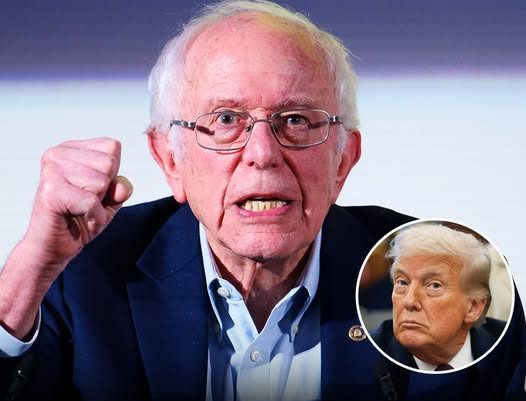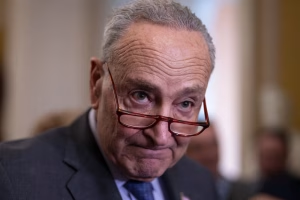Bernie Sanders Sparks Buzz With Claim About Trump’s ‘Settlement Earnings’ — Here’s What We Know
Sen. Bernie Sanders (I-VT) ignited a wave of online debate this week after reportedly commenting on the growing number of legal settlements involving President Donald Trump, suggesting that the former president has “made more from settlements this year than many Americans will see in their lifetime.”
The remark — which has circulated widely on X (formerly Twitter), TikTok, and political forums — has prompted questions about both the accuracy of the claim and the broader issue of how Trump’s legal entanglements intersect with his vast business empire and ongoing 2024 campaign.
While no official record shows Sanders releasing a formal statement or report detailing Trump’s alleged “settlement earnings,” the viral posts attributed to him have renewed focus on the sheer scale of Trump’s financial dealings in the midst of multiple civil and criminal cases.
Background: Trump’s Financial Web Amid Legal Battles
President Trump has faced a series of legal and civil challenges in recent years — including defamation cases, property valuation lawsuits, and ongoing disputes over business practices. Despite the mounting legal costs, he remains financially buoyant through his corporate holdings, licensing deals, and campaign fundraising.
According to public filings and financial disclosures, Trump’s business ventures — spanning real estate, media, and hospitality — continue to generate significant income. But the term “settlement earnings,” as used in the viral Sanders quote, remains ambiguous.
Financial experts note that Trump has paid millions in legal settlements over the years, rather than earned them. However, in certain business or civil arrangements, settlements can include the release of funds, liquidation of assets, or structured payouts from insurance coverage — potentially giving rise to confusion about whether Trump might have benefited financially from certain cases being resolved.
What the Viral Claim Says
Screenshots circulating online attribute the following statement to Sanders:
“Trump has made more money in legal settlements this year than the average American will earn in their life. That’s not justice — that’s a broken system where billionaires profit even when they lose.”
The post, which first appeared on X late Monday, quickly went viral, amassing hundreds of thousands of impressions within hours. Many users shared it with the hashtag #FollowTheMoney, while others questioned its authenticity, noting the absence of any corresponding post on Sanders’s verified accounts.
Fact-checkers have since clarified that no such quote appears on the senator’s official channels or congressional record. However, the claim has sparked a broader discussion about wealth, power, and accountability in the U.S. legal system — themes long central to Sanders’s platform.
Sanders’s Real Position on Trump and Wealth Inequality
Sen. Sanders has frequently criticized the influence of money in politics and the justice system. While there is no confirmed statement of him referencing Trump’s personal settlements this year, he has repeatedly argued that “the rich play by different rules.”
In recent Senate hearings and campaign events, Sanders has emphasized disparities in legal outcomes between average citizens and high-profile figures. “When working people face fines or eviction, they pay the price. When billionaires break the law, they negotiate it away,” he said during a July town hall in Vermont.
His team has not commented directly on the viral claim about Trump’s “settlement income,” but aides have reiterated that Sanders continues to “call out corporate and political corruption wherever it occurs.”
Trump’s Business Position: Settlements, Lawsuits, and Campaign Funding
President Trump, meanwhile, continues to frame his ongoing legal battles as politically motivated. His team has repeatedly stated that many of the civil cases filed against him or his businesses are “nuisance lawsuits” designed to drain resources and distract from his presidential campaign.
According to his 2024 campaign filings, Trump has spent tens of millions of dollars on legal defense. Yet, at the same time, campaign donations have surged following his indictments — with some reports indicating that fundraising spikes have offset much of his personal legal burden.
If anything, Trump’s “earnings” this year have come not from settlements but from donations and new business partnerships linked to his political resurgence. His media company, Trump Media & Technology Group, saw valuation increases tied to Truth Social’s growing user base among conservative voters.
Still, the perception that Trump might somehow profit amid his legal challenges feeds into long-running narratives about privilege, wealth, and influence — narratives that Sanders has spent decades highlighting.
Experts Weigh In
Economists and political analysts have been quick to clarify the nuances behind the claim.
Dr. Stephanie Holmes, a political economist at the University of Chicago, explained:
“It’s very unlikely Trump has earned money directly from any legal settlements this year. However, his financial ecosystem — the combination of campaign fundraising, asset movements, and media engagement — does appear to have benefited from the publicity surrounding his cases.”
She added that viral claims like this one reflect “broader anxiety” about inequality in justice.
“Sanders represents a frustration that’s very real among voters — that wealth allows some people to bend the system to their advantage,” Holmes said. “Even if this particular statement wasn’t directly made by him, it resonates because it fits his well-known message.”
A Broader Conversation About Trust and Transparency
The incident highlights a growing challenge in the digital news era — where unsourced claims can rapidly gain traction and shape public perception. Even when debunked, such statements often leave lingering impressions.
Media analysts note that the Sanders-Trump “settlement” story demonstrates how political narratives can spread far faster than factual corrections. Within 24 hours of the post’s appearance, it had been reshared by over 10,000 accounts, many of which used generative images and AI-edited screenshots to make it appear credible.
This mirrors previous viral misinformation cycles, including false quotes attributed to other prominent figures such as Barack Obama and Elon Musk. The speed of digital amplification often blurs the line between commentary and verified reporting.
Where Things Stand Now
As of Thursday, Sanders’s office has not issued any formal response regarding the viral post. Trump’s campaign also declined to comment on the specific claim, calling it “just another baseless social media rumor.”
What remains true, however, is that Trump’s finances and legal battles continue to attract intense scrutiny. With his 2024 campaign in full swing and multiple court cases pending, every dollar tied to his name — whether earned, spent, or settled — becomes a matter of public interest.
In an age of instantaneous information, both Sanders and Trump find themselves on opposite ends of a digital battlefield — one fueled as much by perception as by fact.
Conclusion
The claim that Bernie Sanders “shared” a shocking total of Trump’s alleged settlement earnings remains unverified. Yet, its viral spread underscores how political discourse in 2025 increasingly depends on speed, emotion, and amplification — not official statements.
Whether intentional or not, the story reignited discussion about wealth inequality, the justice system, and how public figures like Sanders and Trump symbolize two very different visions of American accountability.

James Jenkins is a celebrated Pulitzer Prize-winning author whose work has reshaped the way readers think about social justice and human rights in America. Raised in Atlanta, Georgia, James grew up in a community that instilled in him both resilience and a strong sense of responsibility toward others. After studying political science and creative writing at Howard University, he worked as a journalist covering civil rights issues before dedicating himself fully to fiction. His novels are known for their sharp, empathetic portraits of marginalized communities and for weaving personal stories with broader political realities. Jenkins’s breakout novel, Shadows of Freedom, won national acclaim for its unflinching look at systemic inequality, while his more recent works explore themes of identity, resilience, and the fight for dignity in the face of oppression. Beyond his novels, James is an active public speaker, lecturing at universities and participating in nonprofit initiatives that support literacy and community empowerment. He believes that storytelling is a way to preserve history and inspire change. When not writing, James enjoys jazz music, mentoring young writers, and traveling with his family to explore cultures and stories around the world.









